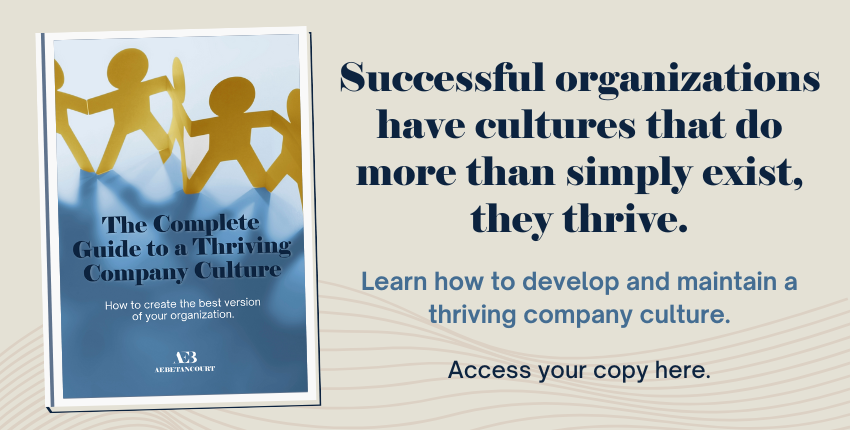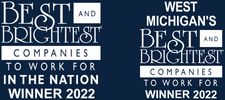Your employer brand matters. Your brand is how job seekers perceive your company in terms of reputation, company culture, and employee retention. Whether or not people are happy working for your company and the length of time they stay employed all contribute to your employer brand. Companies with a strong brand reputation can really differentiate themselves in the job market.
The strongest, most-qualified job candidates are looking for more than just salary and benefits. They’re looking at your brand’s reputation from all angles to determine if they would be a good fit. That means that a bad brand reputation can cost a company a great candidate. According to Corporate Responsibility Magazine, 69% of job seekers reported they would reject a job offered by a company with a bad reputation. And nearly 80% of job candidates say that the overall hiring experience they have is an indicator of how a company values its people (Talent Adore).
The consensus is, your employer brand and reputation are incredibly important to finding perfect-fit hires. Keep reading for a better understanding of why brand reputation is important to hiring organizations, what candidates are looking for and what they want to see before deciding to pursue a new career opportunity, and finally, some practical brand management tips to build, maintain, and even improve your organization’s brand reputation.
The Importance of Brand Reputation
To better understand brand reputation, we have to delineate between brand and brand reputation. Your brand is your organization’s identity. Your brand reputation is how your identity is perceived by the public, customers, competitors, and stakeholders. Brand reputation encompasses the sum of all associations with your brand, as well as various elements and benefits both tangible (salary, benefits, physical workspace) and intangible (workplace culture, values, and community involvement). Your reputation is a combination of the perceptions, interactions, and overall experiences that people have with your organization.
Organizations with positive brand reputations are seen as credible, trustworthy, and desirable, and brands that are trusted and credible tend to be more profitable and more resilient. Customers will seek out brands that they can trust and rely on to do business with, and they continue to support those brands throughout adverse circumstances. A trusted brand reputation can also help to attract and retain quality candidates because just like customers, job seekers will seek out employers they can trust and rely on. Brands with positive reputations actually have higher employee retention rates. Employees who are proud to be associated with your company and brand have higher job satisfaction and will stay.
This means that building a positive brand reputation is critical for success, it is an intangible asset to your organization. And this is especially true in an increasingly online world. Customers, stakeholders, potential employees, and even the general public have access to a ton of information about a brand. Reviews, ratings, social media posts, and any PR – good and bad – can have a huge impact on your brand reputation. The internet opens companies up to intense and detailed public scrutiny, so it is imperative that you not only build a positive brand reputation but maintain it.
Using Your Brand Reputation to Attract Top Talent
Desirable brands are desirable not just to customers, but to potential employees as well, which means your brand reputation can help to attract and retain highly skilled and engaged candidates. Job seekers researching companies during a job search are less likely to choose companies that have a bad reputation. In fact, 82% of prospective employees consider a company’s brand and reputation before applying for a job.
This isn’t just a nice-to-have element of your company brand though. A positive brand image directly impacts your talent acquisition process. Organizations with a positive or favorable brand reputation can get up to twice as many applications as companies with negative or unfavorable reputations. Even more, is that recruiting costs can drop significantly when top candidates want to work for an organization. It not only becomes easier, but less costly, to recruit for positions when candidates are drawn to your organization based on your brand, reputation, and culture.
What Candidates Want (and Expect) to See in the Recruitment Process
Candidates begin forming an opinion about your brand reputation the minute they become aware of your job opportunity. Their experience throughout the entire recruitment and hiring process is vital. Positive reputations are closely linked to high market value, which means your brand reputation could give your organization a competitive edge when up against other organizations in your industry or niche. A great brand reputation can capture the attention of high-quality candidates and help your organization to build a mutually-beneficial relationship from the very start.
When it comes to how your brand reputation can shine through your organization’s recruitment process to ensure candidates have a positive experience, there are 3 main deliverables that candidates want, and often expect, from organizations:
1. Clear, consistent communication
Candidates expect clear details, not just for the position they’re interviewing for but a myriad of other information pertaining to requirements for the role, company culture, and even compensation. And it goes beyond providing information, you must connect with candidates consistently so they never feel ghosted by your organization. All of this will play a large role in the perception of your brand and your reputation as candidates share parts of their experience. There is a level of transparency that an organization can take that shows how invested they are in a candidate and how much they respect the individual, which can boost a brand’s reputation.
2. Visibility into your culture (and their future in it)
Before committing to an employer, top candidates want to see how they might fit into your company’s culture. This is the perfect opportunity to showcase the reasons why your employees are proud and motivated to work for your organization. Some visibility into your culture also allows you to establish credibility and strengthen your brand reputation — which will in turn attract more top candidates. It is a cyclical, highly beneficial process. It’s important to show candidates that your organization isn’t “too good to be true.” Provide your candidates with opportunities to see that they are not only integral to your company but necessary for its future success. Today’s candidates want to be able to envision their future with a good company.
3. Honest and helpful feedback
Candidates today are using every interaction and interview series as an opportunity for learning and growth. Even if you don’t offer them an open position at your organization, it is still wise to consider how your brand reputation might be impacted as you guide candidates through your hiring process. Provide honest and helpful feedback, let candidates know why you passed on them, what made them stand out, and where they might be able to build up their skill set. This will not only leave a positive impression on the candidates but will greatly boost your brand reputation. This is part of playing a long game, because, in the future, that very same candidate may be a perfect fit for a future vacancy.
Tips for Better Brand Reputation Management
Now that it’s clear why brand reputation is important and what candidates are looking for, it’s time to break down some practical tips for building and maintaining a positive reputation. There are three powerful ways to do this and it starts by looking internally at your organization and then building outward, to leave a positive impression.
1. What’s your EVP?
An employee value proposition is critical to your employer brand reputation because it encompasses the main reasons that make your employees proud and motivated to work, or rather, the value that your employees gain from working at your organization. Your EVP needs to be employee-centric and tell the story of your business and why someone should consider joining your team. Then, it needs to be integrated into all aspects of your business to help not only help to retain top performers but attract top talent and boost your brand reputation.
2. Make sure your brand reflects well across the board
From online reviews to staff testimonials to official accreditations, it’s important that you get the word out about your company and the value and benefits you provide to your employees. It’s important to ensure this information is available to job candidates as it helps to build a positive perception of your organization. This means taking an audit of your brand reputation on social media, your website, and through emails to ensure that at every possible touch point, your organization is leaving candidates with a positive impression.
3. Optimize your onboarding process
Candidates begin formulating a judgment on your organization and its reputation the moment they hear about you. Once they are funneled into the onboarding process, those judgments become much clearer. It is important to make your first impression your best impression. This means that every stage of onboarding should be carefully considered. If not, high-quality candidates can quickly become dissuaded from joining your organization. Optimizing your onboarding process includes implementing transparency with candidates, creating a highly organized process, engaging with candidates at every stage, and formulating a thorough, but not overly complicated hiring process to ensure that new hires are set up for continued success with your organization.
Leverage Your Positive Brand Image for Recruiting
Organizations can and should be leveraging their brand reputation to help recruitment efforts and revenue growth. According to CareerArc, 96% of companies believe their employer brand and reputation can positively or negatively impact revenue, but less than half (44%) monitor that impact. For job candidates, a positive brand reputation is a sign they will have a positive candidate experience, and that is imperative to recruiting. Candidates often say that their overall experience is an indication of how a company values its employees, and organizations that value employees are organizations worth working for.
To ensure your brand reputation is perceived positively, there are several tangible efforts your organization can take including improving communications with candidates, auditing your hiring and onboarding processes for maximum efficiency, and generally humanizing and personalizing the process and experiences that candidates will have with your organization. If you’re interested in learning more about how to develop and maintain a thriving company culture, access our resource guide here.


.png)






